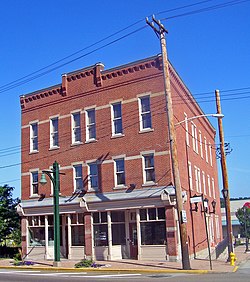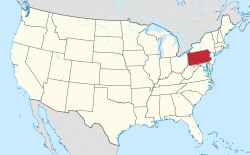Homestead, PA
| Homestead, Pennsylvania | |
|---|---|
| Borough | |

The Bost Building, built in 1892, was AA union headquarters during the Homestead Strike that year, and today is a National Historic Landmark and museum of the Rivers of Steel National Heritage Area
|
|
 Location of Homestead in Allegheny County, Pennsylvania. |
|
 Location of Pennsylvania in the United States |
|
| Coordinates: 40°24′18.25″N 79°54′28.03″W / 40.4050694°N 79.9077861°WCoordinates: 40°24′18.25″N 79°54′28.03″W / 40.4050694°N 79.9077861°W | |
| Country | United States |
| State | Pennsylvania |
| County | Allegheny |
| Government | |
| • Mayor | Betty Esper |
| Area | |
| • Total | 0.64 sq mi (1.67 km2) |
| • Land | 0.57 sq mi (1.49 km2) |
| • Water | 0.07 sq mi (0.18 km2) |
| Population (2010) | |
| • Total | 3,165 |
| • Estimate (2016) | 3,161 |
| • Density | 5,497.39/sq mi (2,120.77/km2) |
| Time zone | EST (UTC-5) |
| • Summer (DST) | EDT (UTC-4) |
| ZIP code | 15120 |
| Area code(s) | 412 |
| FIPS code | 42-35424 |
| Website | www |
Homestead is a borough in Allegheny County, Pennsylvania, USA, in the Monongahela River valley 7 miles (11 km) southeast of downtown Pittsburgh and directly across the river from the city limit line. The borough is known for the Homestead Strike of 1892, an important event in the history of labor relations in the United States. The population of Homestead was 3,165 at the 2010 census.
The area on the south bank of the Monongahela River now comprising the boroughs of Homestead, Munhall and West Homestead saw the first white settlers arrive in the 1770s. One hundred years later, much of the existing farmland on the flats and hillsides by the river was purchased, laid out in lots and sold by local banks and land owners to create the town of Homestead. The town was chartered in 1880. The building of a railroad, glass factory, and in 1881 the first iron mill began a period of rapid growth and prosperity. In 1883, Andrew Carnegie bought out Homestead Steel Works, adding it to his empire of steel and coke enterprises. Carnegie had recently acquired a controlling interest in Henry Clay Frick's coke works on the Monongahela, setting the stage for the dramatic labor clash in Homestead.
Homestead gained international notoriety in July 1892 as the site of a violent clash between locked-out steelworkers and hired Pinkerton guards, known as the Homestead Strike. When Henry Clay Frick, manager for Andrew Carnegie, owner of the local Homestead Steel Works, announced in the spring of 1892 that skilled workers would receive a reduction in wages, the advisory committee of the Amalgamated Association of Iron and Steel Workers refused to sign a new contract. Carnegie's management locked the workforce out, declaring that the union would no longer be recognized at the steel works.
...
Wikipedia
